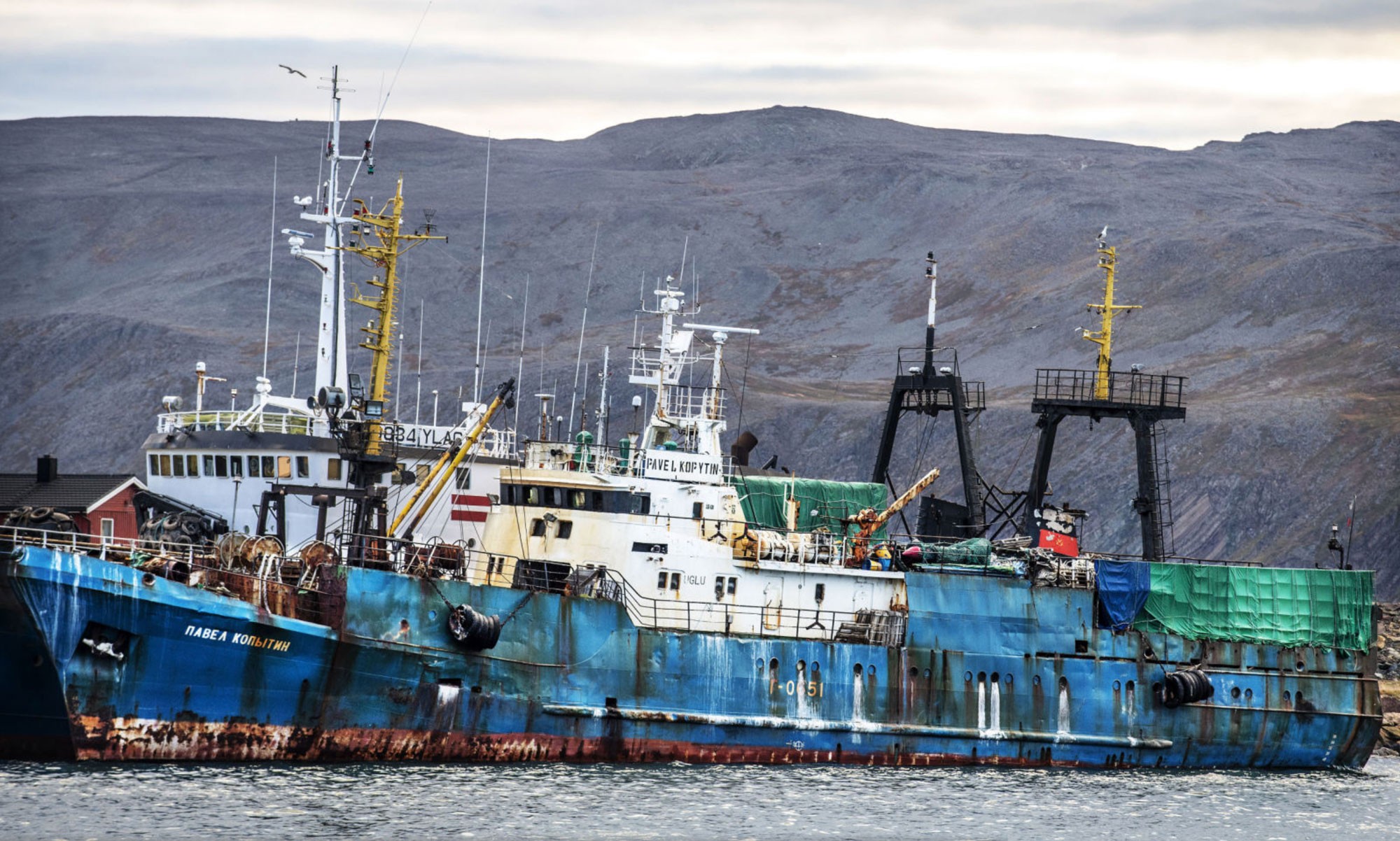
Secret slave contracts
By: Siri Gedde-Dahl, Gunnar Thorenfeldt, Leif Stang, Ola Strømman and Hans Arne Vedlog (photo), translation: Boris Kochetkov
This article is published in cooperation with Dagbladet, which has published a series of articles about this issue in Norwegian.
BÅTSFJORD / ODESSA / OSLO (Dagbladet): 18-hour workday and six hours of rest. For just a little over 4000 Norwegian kroner and a carton of cigarettes a month. Such are the brutal conditions in employment contracts of Indonesian seamen on a number of snow crab boats in Båtsfjord, northern Norway. Dagbladet has access to the contracts.
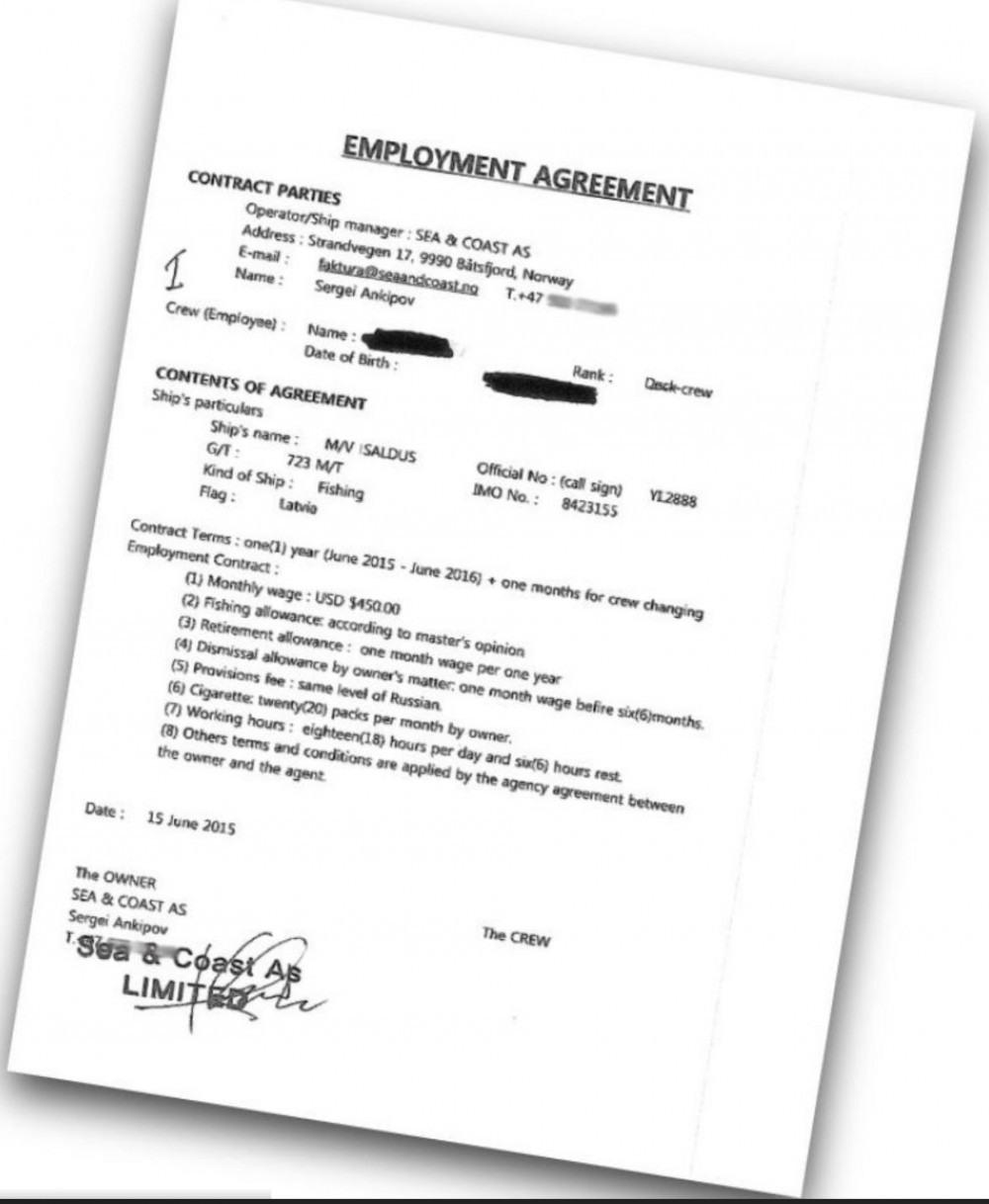
- It was painful to see what it was like for the Indonesians. Some of the people I spoke to had worked aboard the boat for over two years, says a Ukrainian sailor Dagbladet met in Odessa. He worked on one of the Båtsfjord-based boats owned by the Latvian company Baltjura-serviss.
«It was painful to see what it was like for the Indonesians. Some of the people I spoke to had worked aboard the boat for over two years»
Ukrainian sailor
He does not dare to have his name and photo published, but he has shown us his own employment contract, a seaman’s visa and cell phone photos of the crab vessel.
ADVERTISEMENT
Irina Kravchenko, the widow of Dmitry Kravchenko, who disappeared at sea from the Baltjura-serviss boat «Kalmar» on September 4, says:
- My husband told me that the Indonesian seamen were treated as slaves. They had to wear old clothes until they almost fell off. They did not get enough food and they starved. Even though they had to work more than the rest of the crew, they earned a lot less than the others. And often they did not even get the agreed wages.
THE UNKNOWN HELL: Dagbladet reveals everyday life on board snow crab boats that operated from Båtsfjord. Video: Øistein Norum Monsen and Gunnar Thorenfeldt. Edit: Per Ervland
As Dagbladet Magasinet wrote earlier, she cannot get in touch with her deceased husband’s employer, which was not the ship owner but a crewing company in Seychelles with unknown owners. The Batljura-serviss snow crabbing fleet in Båtsfjord also included the vessels «Valka», «Dubna» and «Memele».
Indonesians at the bottom
While Irina’s Ukrainian husband was properly paid, the situation was different for the Indonesians who had been recruited to work for this and other fishing companies in Båtsfjord. According to several sources, the Indonesian seamen also had to work all week without a day off. This means that their hourly wage was 8-9 kroner.
They were flown from Jakarta to Dubai, from Dubai to Oslo, from Oslo to Alta, from Alta to Båtsfjord. There they boarded crab boats.
According to information Dagbladet has received, there are reportedly about 50 Indonesians who were brought to Båtsfjord to work on various boats under such contracts.
Norway’s most well-known human trafficking lawyer, prosecutor Rudolf Christoffersen, has a very strong reaction to the content of the contract.
- Dagbladet’s information indicates that there may be a violation of human trafficking law, says Christoffersen
«There may be a violation of human trafficking law»
Rudolf Christoffersen, prosecutor
Today he is Norway’s representative in the Council of Europe’s Group of Experts on Action against Trafficking in Human Beings, GRETA. «Organized trafficking in human beings is punishable by up to 15 years in prison» says the prosecutor.
The employment contracts and documents show that one of the boats the Indonesians were hired to work on was «Saldus». The vessel is owned by the Latvian company North Star. It delivered raw material to the crab factory Seagourmet Norway, which in 2015 was going to become Båtsfjord’s new key business. North Star’s snow crab fleet in Båtsfjord consisted of the boats «Saldus», «Solveiga», «Solvita» and «Senator».
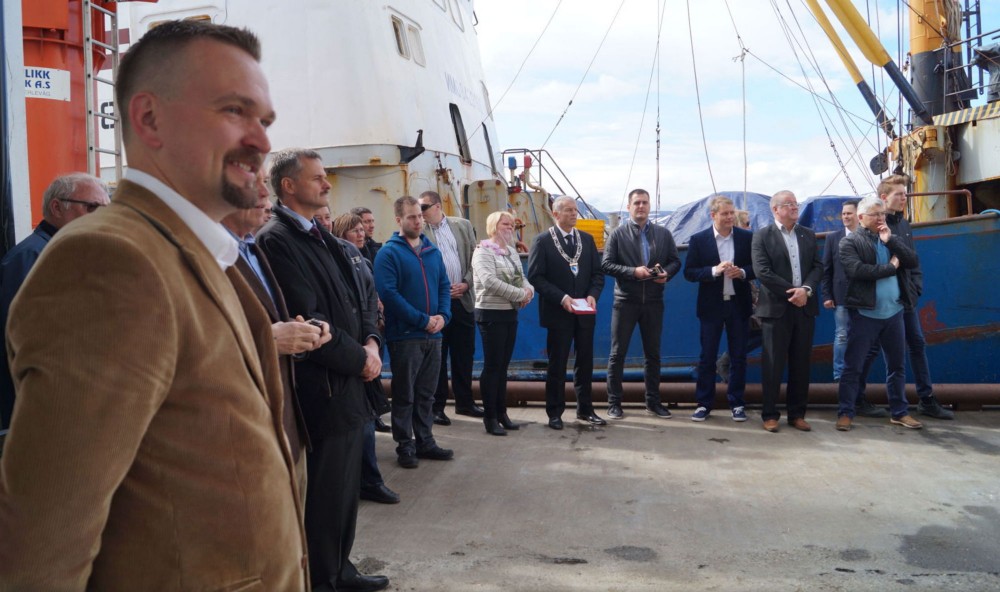
Grand opening
Outside a white-painted factory building on Båtsfjord’s waterfront, Mayor Geir Knutsen (Labour Party) cuts a red silk ribbon and declares the Seagourmet snow crab factory open. It is June 10, 2015. Already for a month, about 30 people from the Baltics have been busy cutting crab claws and feeding production lines with this prickly delicacy.
The snow crabs unloaded from rusty blue-white hulls on the dock north of Varanger Peninsula will end their journey on restaurant tables in the US and Asia, with some of them delivered to the kitchen still alive. Snow crab is also among the top delicacies on the restaurant tables at Tjuvholmen and Akershuskaia in Oslo.
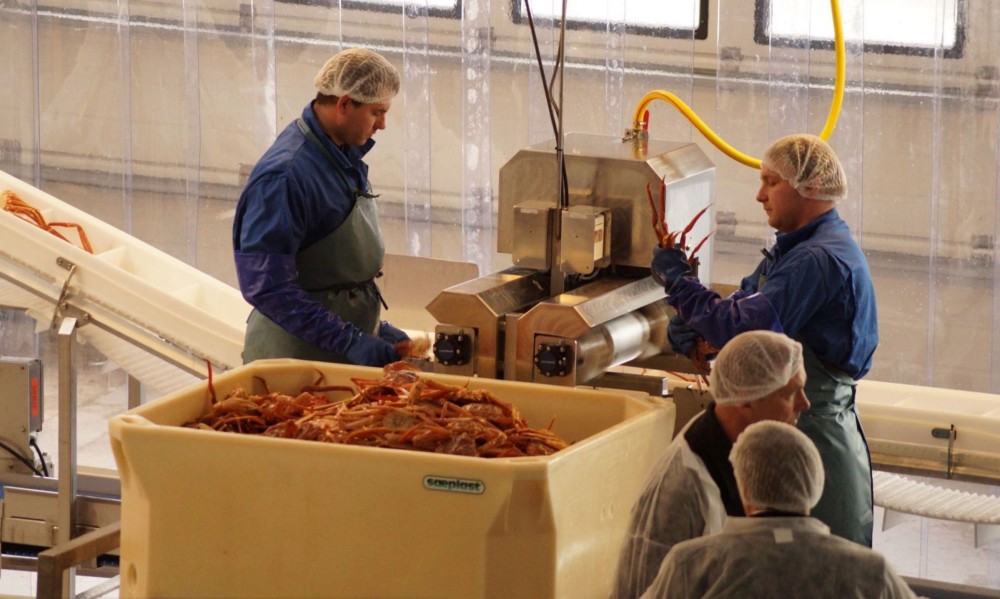
Indulus Abelis, then Latvia’s ambassador to Norway, is standing upright outside the crab landing site. He has made the trip to the far north to make fuss of the founders. His fellow countryman Peteris Pildegovics, born in Vladivostok, raised in Latvia and with background in banking, owns and operates the Latvian company North Star, a supplier to Seagourmet.
North Star and Seagourmet have entered into a partnership with the cousin of Pildegovics, Kirill Levanidov, who is the main owner of the factory. He is also from Vladivostok. He received economic education in Japan and worked his way up as a fishing industry investor and middle man in Japan and South Korea before moving to Seattle, the fishing capital of the US. There he runs the company Link Maritime as a US citizen.
Levanidov owns 40 percent of the Norwegian-registered Seagourmet. Three others own 20 percent each. Dagbladet has not been able to get in touch with them.
The promising new key company in Båtsfjord was supposed to have as many as 75 employees.
- We were so excited that they had chosen Båtsfjord, Mayor Geir Knutsen told Dagbladet in September 2018.
Playground and slave contract
The shiny mayor’s chain of office with silver-colored fishing hook was also present in August 2015, when the mayor opened a playground. «Built with consideration and support from Seagourmet Norge AS.» reads a small brass plate at the playground.
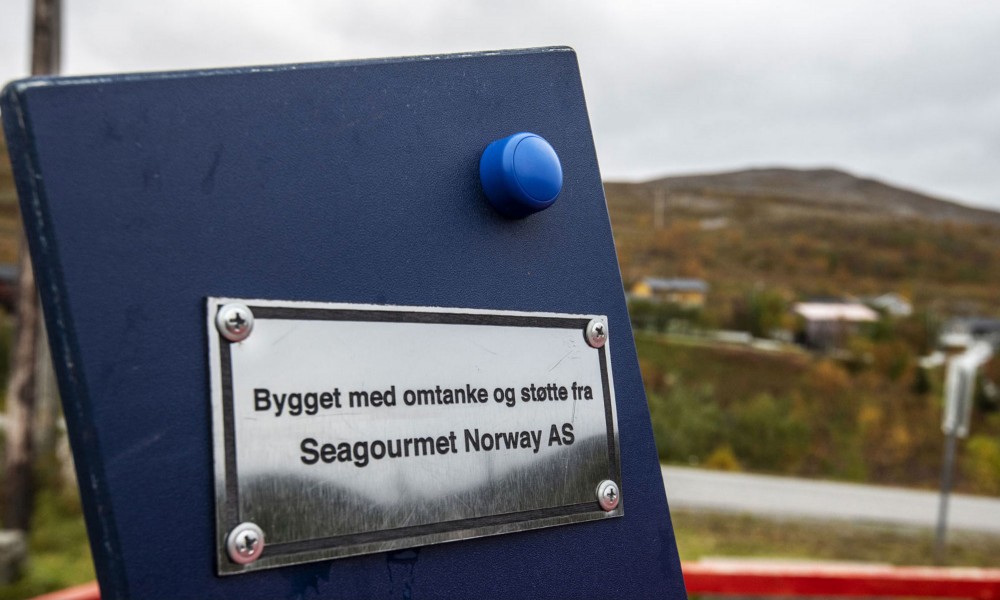
- We show social responsibility. We have not come here to skim the cream, Seagourmet owner Kirill Levanidov told Dagbladet in September 2018. The company has sponsored two playgrounds and a concert of the Norwegian band DDE during a local festival.
For the Indonesians aboard the Latvian vessel «Saldus» there was little cream to skim.
- These are slave contracts. Latvia is an EU country, and it is illegal to work for more than 13 hours a day, says Angelica Gjestrum, coordinator of the International Transport Workers’ Federation in Norway.
Dagbladet has shown her the employment contracts of the Indonesians.
- This is bad. I do not know if I should laugh or cry. Just to think that you can use such slave contracts in Norway, says Gjestrum.
The contract states that the seaman will get a share of the catch, but it is «according to master’s opinion».
- It means nothing. If the captain does not want it, it does not mean a thing, says Gjestrum.
The Indonesians on «Saldus» were employed by the Norwegian agency Sea & Coast, wholly owned by Peteris Pildegovics. As already mentioned, Pildegovics also owns the Latvian company North Star and thus the boat «Saldus».
«Fake contract»
Pildegovics and his partner Levanidov reject any relation to the employment contracts, as Dagbladet presents one of the identical contracts to them. They think it’s fake. The contract is signed by Sergei Ankipov, former general manager, chairman and project manager at Sea & Coast.
- This is not just a fake signature, it’s not like it at all, it’s another signature. The document us not from Sea & Coast. This company never hired any crew for any vessel and never had the authority to sign employment contracts, says Kirill Levanidov on behalf of Sea & Coast.
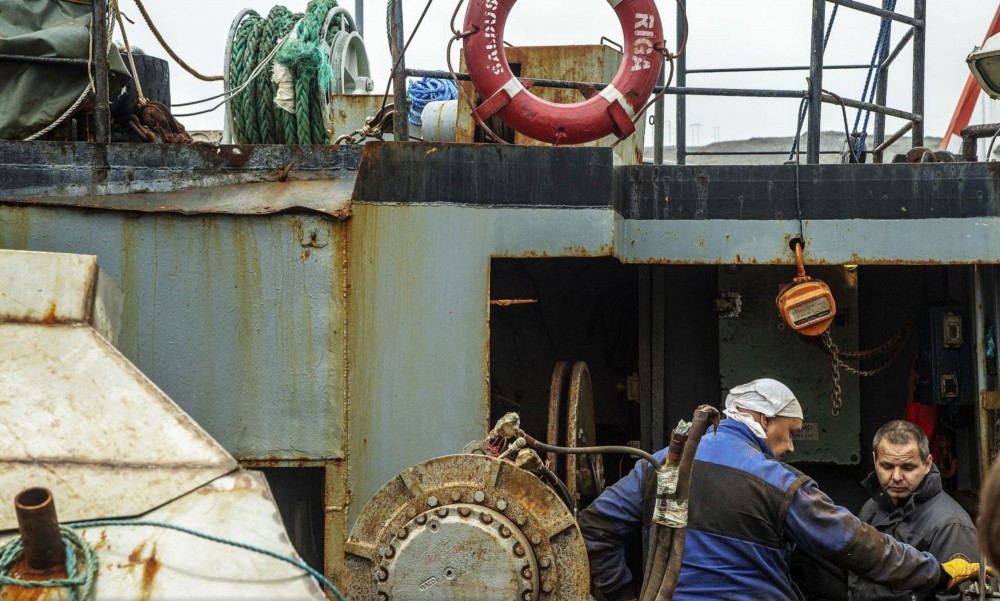
The two also believe the seal of Sea & Coast is fake. Dagbladet has met Sergei Ankipov, showed him the contract and asked him if he could confirm the signature. He has refused to talk to us.
- It’s common for the crew to work longer on some days, while they have shorter days later. This depends on the catch, weather and how active the boat is. Sometimes the crew only works for a couple of hours a day, on other days they work up to 16 hours, says Levanidov.
Levanidov has forwarded food procurement lists from «Saldus» to Dagbladet to show that there was never a shortage of provisions there. He says the Indonesians had the same conditions as other crews on North Star’s boats.
The agent
Russian fishing companies Paros, Albakor Prim and Promrybflot also participated in snow crab fishery out of Båtsfjord. They came with the vessels «Pavel Kopytin», «Nikolay Kasatkin», «Solaris», «Selenga», «Sokol», «Santana», «Start» and «Nadir» to name a few.
It is Sea & Coast Ship that acts as a ship agent and a middle man for the entire network of foreign snow crab vessels in Båtsfjord. Pildegovics confirms to have been the agent for boats of Paros, Albakor Prim and Promrybflot, but denies to have had anything to do with Baltjura-serviss.
Dagbladet has employment contracts for the Baltjura-serviss boats, signed by Sea & Coast. Pildegovics and Levanidov believe these are also fake. North Star and Baltjura-serviss have joined forces to establish and finance the lobbying organization Eurocrab in Latvia. The organization’s website is closed after Dagbladet began asking questions about the business.
Baltjura-serviss has not responded to Dagbladet’s requests for comment.
Båtsfjord’s prosperity
In Båtsfjord, the snow crab party lasted for two or three years with new jobs, increased turnover and new tax revenues. By the end of 2016 the revenues of the boats from landings of snow crab in Norway reached 900 million kroner.
Foreign vessels accounted for two thirds of that and much of the crab was unloaded in Båtsfjord.
Revenues from port dues in Båtsfjord doubled from 8 million in 2013 to 16 million in 2016.
Båtsfjord’s cold store Centralfryselager, where the municipality owns more than a half, also saw its turnover increase by over 50 per cent. Crab traffic contributed to the fact that both the cold store and the harbor invested in large expansions.
«Pirate village»
«Pirate harbor Båtsfjord» or «Pirate village». That is how the municipality on the outer side Varanger Peninsula in Finnmark known among Russian seamen. Dagbladet has heard it both from Seafarers’ Union of Russia and a number of seamen we have been in contact with.
In 2016, Seafarers’ Union of Russia received about fifty complaints from Russian seamen who had worked 16-hour days for months without rest days. Who had worked and lived on rundown ships in dangerous and unhygienic conditions during the fishery. And who had not received wages for three to four months.
They are crew members of the snow crab boats of the Russian companies Albakor Prim, Paros and Primrybflot. And they were based in Båtsfjord, the village which calls itself «The fishing capital of Norway».
Dagbladet has collected accounts and documents from around 40 seamen from the Russian and Latvian companies. They support the picture drawn above.
None of the Russian companies has responded to Dagbladet’s inquiries. Levanidov and Pildegovics have refused to give us additional contact details or to convey questions to their customers.
The factory closes
In 2016 the snow crab fishery was over. Then both Norway and Russia introduced fishing regulations barring foreigners from the crab grounds in the Barents Sea. In the autumn, the Seagourmet crab factory had to stop production.
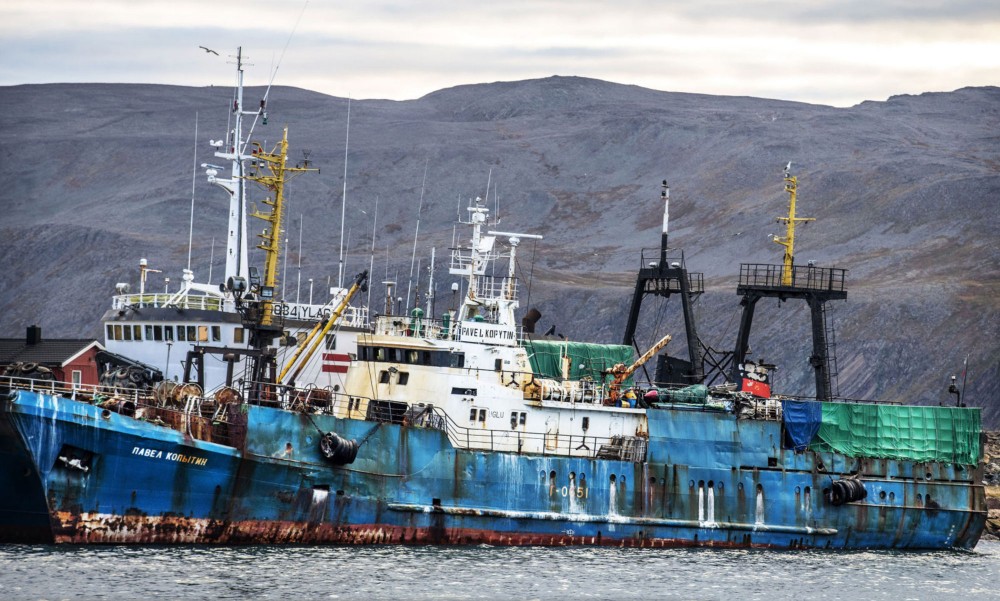
An abandoned and very rusty «Pavel Kopytin» owned by the Russian company Albakor Prim was one of the three remaining snow crab vessels in Båtsfjord when Dagbladet visited the place in September 2018. Its engine has been removed and the owners are nowhere to be found.
Also, «Senator», which was detained by the Coast Guard on January 17, 2017 for illegal fishing, is still in Båtsfjord. The criminal case is now in Supreme Court, where the Latvians contest Norwegian sovereignty over snow crab. The verdict is expected soon.
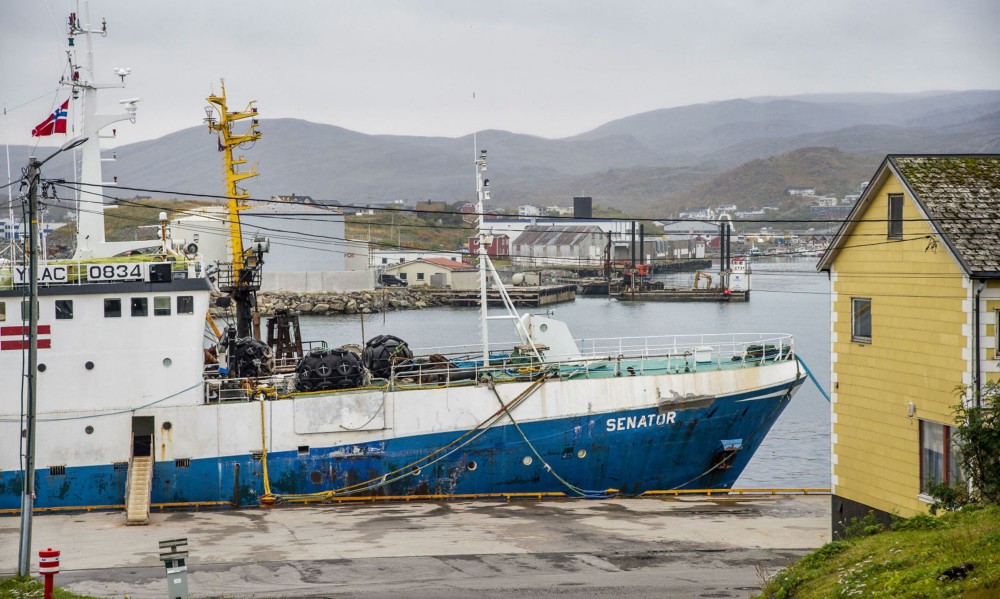
Live shrimp
In September 2018, all activity at Seagourmet’s large white factory hall Kirill Levanidov has to show Dagbladet are some plastic boxes with live king crab.
The king crab belongs to another local company, which only rents space. Other than that, the production lines Levanidov invested in are silent. Large stacks of South Korean crab traps are waiting in a storage room.
At the same time, the rusty and messy looking «Saldus» is still lying at the dock with full crew, Russian and/or Ukrainian.
- We conduct experimental fishing for shrimp with traps to deliver them alive, says Kirill Levanidov. Shrimps are usually fished with trawls.
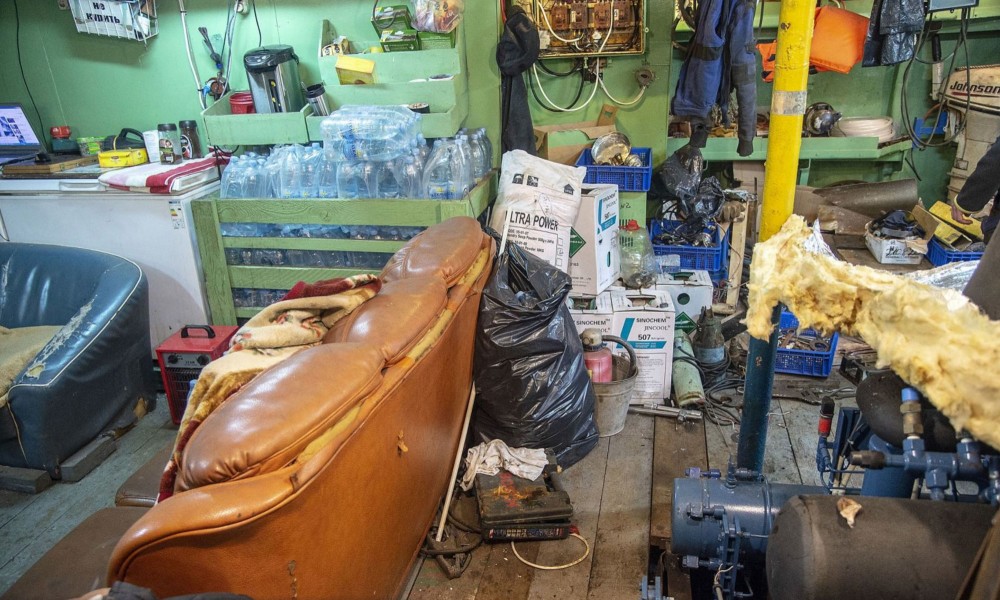
Experienced fishermen are skeptical of fishing for shrimps with traps. It’s hardly possible to catch anything, they believe. And the Coast Guard also wonders why they fish shrimp in the Norwegian part of the Smutthullet. There is little shrimp there, according to Coast Guard.
- It’s closer to the shore. We conduct experimental fishing, Levanidov emphasizes.
Money waster
Kirill Levanidov established the Norwegian company Seagourmet Norway in 2009 to harvest king crab. He bought the bankrupt Ishavsbruket factory and staff housing quarters in Båtsfjord, brought in more owners and switched over to snow crab.
Now there is no snow crab, but Levanidov is still committed. He believes that the snow crab fishery will be reopened for the EU vessels.
In 2015, the company received NOK 10 million in fresh equity. Nevertheless, Seagourmet ended 2017 with an equity loss of 21 million and 57 million kroner in debt. Patient lenders have given long-term and partly interest-free loans.
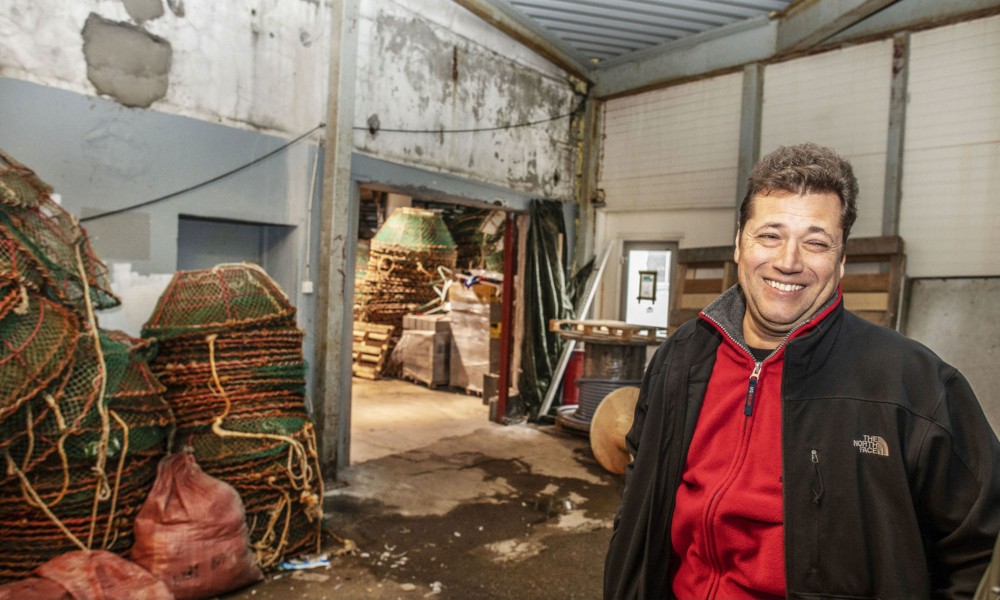
- We think long-term and have come here to stay. We have invested $12 million in Båtsfjord, says Kirill Levanidov.
It is around 100 million kroner.
- Where does the money come from?
- From lenders who believe in us, from our buyers in Japan and the United States. Mostly from a major buyer in the US.
Levanidov does not want to disclose the name.
So it is unclear who provides large loans for a prohibited fishery in Båtsfjord. And how long they are willing to invest in a money-losing business.
Optimism
The management of Båtsfjord Havn KF (Båtsfjord Port Authority) says in the magazine «Kystens fiskerihovedstad» (“The fishing capital of the coast”) published by Båtsfjord Municipality on November 24, 2017: «(…) We are optimistic about future development, says Geir Knutsen, chairman of the board. Now he is waiting for the Seagourmet Norway AS snow crab factory to restart its operations, and for the trawlers from Lithuania, which have been laid up in Båtsfjord for several months, to be able to start fishing for snow crab again. This will have a great positive effect on the entire Båtsfjord community.
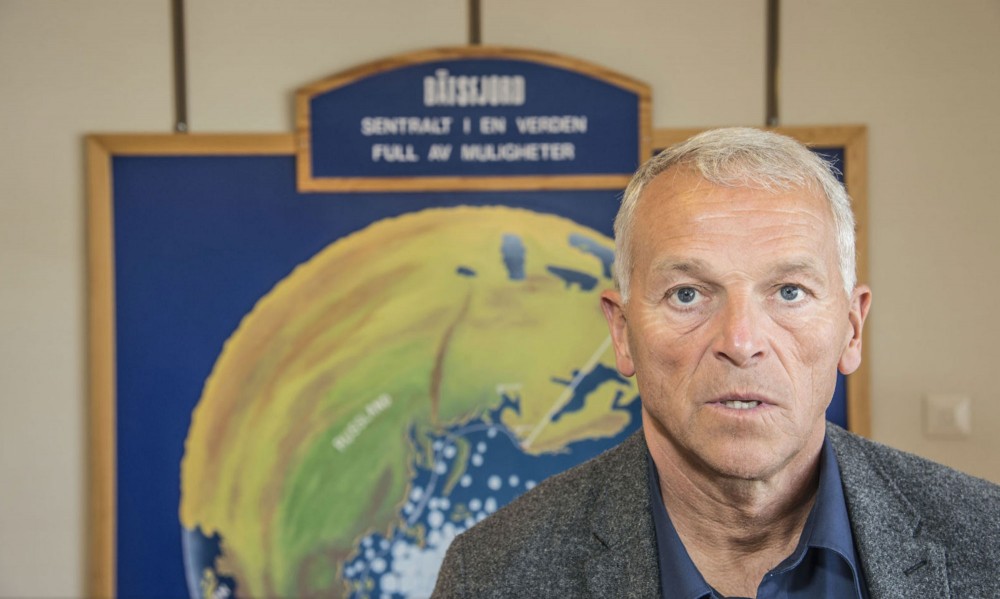
Mayor Geir Knutsen has been fighting for the factory in Båtsfjord. He has contacted ministers and fellow party members in the committee on business and industry at the Parlament: There must be a solution so that the factory can get raw material, which they can only get from their own ships because they want live crabs. The Norwegian ships freeze the crab at sea.
Lobbyists
The then Norwegian fisheries minister Elisabeth Aspaker visited Seagourmet in September 2015. Kirill Levanidov has met both the then Minister of Fisheries Per Sandberg and the then EU Minister Frank Bakke Jensen, who is also a former mayor of Båtsfjord.
No later than September 10 this year, Mayor Knutsen and snow crabber Levanidov sent a joint letter to the new Fisheries Minister, Harald Tom Nesvik, asking for a meeting.
But government ministers do not have any crabs to give away. Not because they are concerned about social dumping but because they have the interests on the Norwegian continental shelf in mind.
Earlier Mayor Geir Knutsen told Dagbladet that he had not been aware of bad working conditions on the ships. After being shown the terms of the «Saldus» contract described in this article, he said:
- I am shocked by what has transpired. I have never seen anything like it. As I said earlier we were not aware of anything like this. Had we had knowledge of this, we would have reported this to the Norwegian authorities. In this case, we will most likely first consult with the Labor Inspection Authority.
After this article was published Sergei Ankipov’s lawyer contacted Dagbladet, claiming Ankipov has nothing to do with the «slave contracts» and that his signature is falsified (in Norwegian).
Send tips
Do you have tips or information related to this article?
Send e-mail to krabbekrigen@dagbladet.no
Secure drop for encrypted tips:
Click here.

